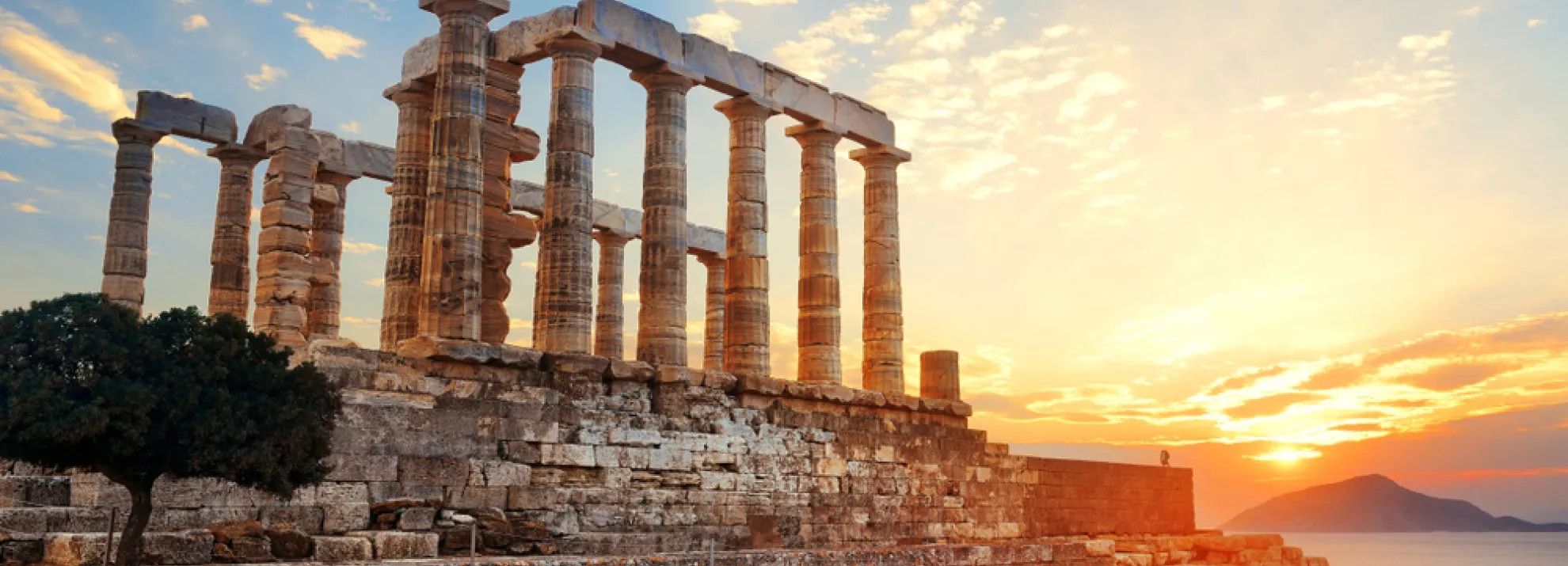Athena: the patron of ancient Athens
It is said the beauty and glory of Athens once enraptured the gaze of the gods so fervently it caused an almighty clash upon heavenly Mount Olympus. Zeus chose the two greatest contenders to battle for the rite of patronage upon this acclaimed kingdom: Poseidon, god of the sea, and Athena, goddess of wisdom and warfare.
They each had to prove their worth to the mortals by gifting the land. Poseidon raised his mighty trident and plunged it into the ground, creating a burst of water. But the water was too salty to drink. Athena kneeled to the ground and planted a seed which immediately grew into an olive tree. This provided shade, shelter, food and – of course – olive oil, a culinary marvel in Greek gastronomy. Athena, therefore, won her prize, claiming Athens as her own.
To this day, an ancient olive tree grows in the shadow of the Acropolis which you will discover during a guided tour with a local expert on Day 2 of our small group tour of Greece.
Dionysus and the full-bodied festivities of Naxos
Across the glittering waters of the Aegean Sea lies the largest of the Cyclades, Naxos. In ancient times, this island was dedicated to the son of Zeus and Princess Semele: Dionysus, god of wine and revelry. There, he captivated the minds of young satyrs and maenads who drank wine, danced in forests and worshipped his name through festivities and sacrifice. In return, Dionysus replenished the ground with rich nutrients and vast growth which led to bountiful lands.
During our three-night stay on Naxos, we’ll have the opportunity to visit the remains of Temple of Dionysus, savour decadent dishes (including a local cookery class) and absorb Dionysus’ ancient offerings!
The beginning of ancient Olympics with Hercules
According to Pindar, a magnificent lyric poet, Hercules (Heracles in Greek) - the great athletic hero of ancient Greece is tied to the beginnings of what we have come to cherish in the sporting world: the Olympic Games.
Pindar tells the tale of the Labours of Hercules: jealous Hera, queen of the Olympian gods and Zeus’ sister-wife, induced a madness within him which led to him murdering his wife and children. In search of guidance, Hercules sought the Oracle of Delphi who told him to serve the king of Mycenae for ten years. During this time, he completed twelve impossible feats, from slaying the vicious Nemean lion and monstrous nine-headed Lernaean Hydra to capturing the striking Cretan bull and grotesque hound of Hades, Cerberus. Once he accomplished his labours, Hercules created the ancient Olympics in honour of the king of the gods himself, his father, the formidable Zeus.
During the latter days of our Greek tour, you will encounter legendary Olympia and see its glory. Whilst you stand upon the grounds of the Olympia site that used to quake under the forces of athletes and crowds, imagine its extraordinary beginnings and the hero who started it all.
Apollo and the Oracle of Delphi
As you take in breathtaking views of Delphi’s staggering mountainsides and golden skies, imagine a time when a priestess held court in honour of Apollo, god of music and prophecy. For over a millennia, people of all ranks travelled from afar to meet with the Pythia to hear their fortune.
A particular tale tells of King Croesus. After providing the Oracle of Delphi with a momentous gift in exchange for the favour of Apollo himself, Croesus received the famous prophecy: If Croesus goes to war, he will destroy a great empire. Thus, he waged war against the Persians in hope of a spectacular victory. He was defeated, showing the ambiguity of such prophecies spoken by the gods.
By the 4th century, prophesising was abolished and the role of Pythia perished due to the conflict with Christian beliefs championed by Rome.
Eager to delve further into the abyss of Greek gods and heroes? Take your seat on a voyage across glittering waters, sacred cities and legendary birthplaces and discover our 12-day Greece: Legends and Landscapes tour here.

